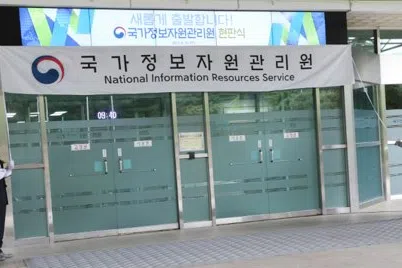South Korea data centre fire started during safety work; President Lee calls for improved security
Sign up now: Get insights on Asia's fast-moving developments

The fire at the National Information Resources Service in Daejeon lasted roughly 10 hours and disrupted the operations of 647 major government systems.
PHOTO: SMARTNIRS/X
SEOUL – South Korean President Lee Jae Myung has pledged a “significant improvement” in the security of government administrative systems after a major fire at the national data centre crippled online services around the country.
A fire at the country’s National Information Resources Service (Nirs) late on Sept 26 caused widespread disruptions in public services, with airports and the post office among the most significantly affected on Sept 27.
The blaze started while workers were transferring batteries as part of a fire prevention project, according to local media reports on Sept 28.
Workers at Nirs in Daejeon were removing lithium-ion batteries from a server room. The move was prompted by a 2022 fire at SK C&C’s data centre in Seongnam which disrupted major services including Kakao, Daum and Naver.
The earlier fire was caused by lithium-ion batteries in the uninterruptible power supply.
The government agency judged it risky to keep the national computer systems and batteries in the same place. After securing a budget, it began relocating batteries to the basement.
The 384 battery packs were divided into six groups, with the fire starting during the relocation of the second group.
The blaze broke out at around 8.20pm in a server room on the fifth floor when an uninterruptible power supply battery suddenly sparked. It happened about 40 minutes after the staff had cut power to shift the batteries.
Fire officials said the server room’s layout, with only 60cm between the high-risk batteries and major servers, and 1.2m between servers, made extinguishing the blaze especially difficult.
At the time of the incident, contractors working on the relocation, inspection teams and equipment manufacturers were on-site. One contractor suffered first-degree burns to his face and arm while shutting down the battery power.
The fire was extinguished at around 6.30am on Sept 27, roughly 10 hours after it began. The accident has suspended operations of 647 major government systems.
Mr Lee said the country will have to launch a so-called “dual system” for data security for emergencies.
“I don’t understand why we don’t have an emergency plan for this kind of predictable event,” he told officials. He asked ministers to propose new budgets to prevent such accidents and to investigate the fire thoroughly.
Among the services affected was Korea Post’s online system, which provides mailing information and financial services including savings and insurance.
“I had a package arrive from overseas this weekend, and it is supposed to be delivered next week. I really need it before (the upcoming holiday period) Chuseok. Will it make it?” one worried user wrote on Blind, a workplace community app, on Sept 27.
Another user commented that international deliveries would be even harder to expect under the current circumstances.
A different customer shared a screenshot showing his parcel had reached East Seoul’s sorting centre on Sept 26. “Will it still come by Monday?” he asked. A reply read: “The fire knocked out the computer system. Nothing is being processed.”
With Chuseok approaching, the disruptions are especially concerning. Food items are commonly sent by mail during the season, and postal volume handled by Korea Post is projected to rise 4.8 per cent from 2024 to an average of 1.6 million parcels per day.
The impact has extended beyond mail, with Korea Post’s banking service suffering transfer and account access failures.
Ms Shin Bo-young, 35, who needed to send money for a co-worker’s wedding on Sept 27, asked another colleague attending the event to hand over the cash.
“Of all weekends, it had to stop working on the day I needed to send money through the Korea Post app,” she said.
The outage froze South Korea’s mobile ID system, disrupting hospital check-ins, domestic airport boarding and other services that require identification.
The Korea Airports Corporation urged travellers at all 14 domestic airports to carry physical ID as inconveniences mounted on Sept 27.
“If my daughter had not warned me, I would have missed my flight, since I usually only carry my mobile ID,” said Mr Song, who is in his 60s and was travelling from Jeju to Seoul.
Unmanned kiosks at district offices failed to operate, adding to the disruption.
Public demand for services is generally lower on weekends, but experts warned that if systems were not restored by Sept 29, mass confusion could follow.
Prime Minister Kim Min-seok urged officials on Sept 27 to prioritise the restoration of critical services. “Please focus first on services directly tied to people’s economic activity, such as Korea Post’s financial functions, and those that will cause immediate inconvenience during the Chuseok holiday, such as Korea Post’s parcel delivery,” he said.
“Systems widely used by the public, including Government24, must also be restored as quickly as possible.”
Government24 is a platform that allows for the processing of more than 870 types of documents, such as resident registration certificates, without requiring an in-person visit.
Key services that have been suspended include the Anti-Corruption and Civil Rights Commission’s online petition system and the mobile ID and information disclosure system.
Payment services for police traffic fines were suspended. Fines are processed through a national integrated financial system called “D-Brain”, which stopped operating due to the fire. THE KOREA HERALD/ASIA NEWS NETWORK, REUTERS


